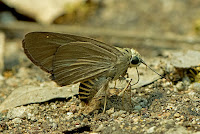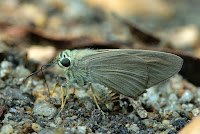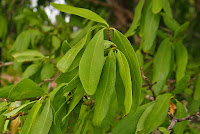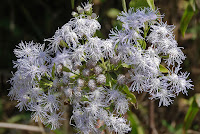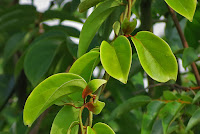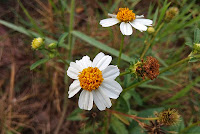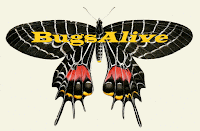Badamia exclamationis
DATASHEET
Common Name:
Taxonomy:
Morphology:
Sexual Dimorphism:
Distribution:
Flight time:
Habitat:
Life History:
Voltinism:
Larval hosts:
(all locations)
Adult food sources:
(all locations)
Photos:
(Click to view large)
the Brown Awl Photos at the bottom of the page
Arthropoda - Insecta - Lepidoptera - Hesperiidae - Coeliadinae - Badamia - exclamationis (Fabricius,1775)
wingspan - 45-55mm, wing colour - UP is medium brown with darker margins and some small semi-transparent spots which vary between sexes, UN is greyish-brown and is distinctive because of the narrow wing shape that is different to other members of this subfamily, eye colour - black, proboscis colour - black, antennae colour - black, abdomen colour - brown/yellow striped, leg colour - yellow, flight - strong
only minor differences that cannot be differentiated in the field
Sri Lanka, India, Nepal, Bhutan, Bangladesh, Myanmar, Thailand, Laos, Cambodia, Vietnam, China, Taiwan, Malaysia, Singapore, Indonesia, Philippines
all year depending on location
edges of evergreen and deciduous forest
¦¦ egg 2 days ¦¦ instar1 2 days ¦¦ instar2 2 days ¦¦ instar3 3 days ¦¦ instar4 3 days ¦¦
¦¦ instar5 4 days ¦¦ pupa 9 days ¦¦ Total egg-adult 25 days. All times approximate.
multivoltine
Anogeissus acuminata, Combretum albidum, Combretum decandrum, Combretum latifolium, Combretum ovalifolium, Combretum sundaicum, Terminalia bellirica, Terminalia bialata, Terminalia brassii, Terminalia calamansanai, Terminalia catappa, Terminalia complanata, Terminalia oblongata, Terminalia seriocarpa (Combretaceae), Hiptage benghalensis, Rhyssopterys timorensis, Tristellateia australasiae (Malpighiaceae), Ficus cunia, Ficus virens (Moraceae), Chionanthus purpureus (Oleaceae), Millettia pinnata (Fabaceae)
Actual host plant used depends upon location and availabilty of plant species.
Nectar: Bidens pilosa, Chromolaena odorata, Tagetes sp. (Asteraceae), Asystasia gangetica (Acanthaceae), Lantana camara, Stachytarpheta frantzii (Verbenaceae), Glycosmis sp. (Rutaceae), Buddleja sp. (Scrophulariaceae), Celosia argentea (Amaranthaceae)
NOTE: there are probably other nectar sources that have not been recorded
Other: mud puddling, bird droppings

